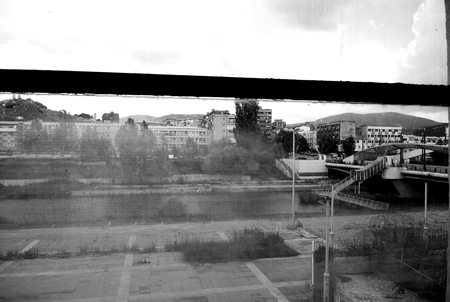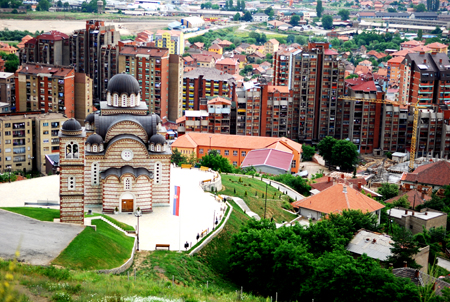 Mitrovica, Northern Kosovo-Kosovo is beautiful in the summer with its rolling hills, lush fields and emerald green lakes. In the towns hit hardest by the civil war in the late 1990s, reconstruction has largely been successful. In Pristina, the capital of Kosovo, cafés are packed with young Kosovars drinking espresso; summer nights are vibrant, bars and restaurants are full.
Mitrovica, Northern Kosovo-Kosovo is beautiful in the summer with its rolling hills, lush fields and emerald green lakes. In the towns hit hardest by the civil war in the late 1990s, reconstruction has largely been successful. In Pristina, the capital of Kosovo, cafés are packed with young Kosovars drinking espresso; summer nights are vibrant, bars and restaurants are full.
A sense of normalcy has returned to many parts of Kosovo. In the eyes of many of its inhabitants, the status of Kosovo has been settled in spite of the continued UN administration. Signs of positive change in Kosovo are obvious, yet the dilemma of inter-ethnic reconciliation remains. As the United States Institute for Peace says, "No solution for Kosovo can last without a solution for Mitrovica."
Mitrovica is Kosovo’s notorious ethnically divided city. On the northern side of the Ibar river lives a majority of Serbs, on the southern side lives a majority of Albanians. The city is embroiled in what observers call a ‘frozen conflict’: while inter-ethnic violence has decreased, an intractable tension persists between the Serb and Albanian populations.
The white bridge straddling the Ibar in the center of Mitrovica is reminiscent of the Berlin Wall and has come to symbolize division between ethnic groups. Rarely will you hear Albanian spoken in Northern Mitrovica, and the lone Albanian who does venture in carries fake ID and speaks English. Serbs fear traveling into the southern area, although the region has been relatively secure since 2004. While movement between the areas is not limited per se, both communities are distrustful. Ylber Kusari, a young Kosovar enrolled in a Master’s program in Balkans Studies in Toronto, points out that Northern Mitrovica is unofficially Serbian territory; Belgrade continues to support and act as the de-facto government there. On May 11th, Kosovar Serbs were invited to vote in the Serbian elections at voting booths set-up in their neighborhoods.
In 2005, the US government website reported that "failure to secure a multi-ethnic Kosovo would be a failure of our efforts over the last six years and indeed, the last decade." Recently, Knut Vollebaek, the Organization for Security and Co-operation in Europe (OSCE) High Commissioner on Minority Rights stated, "neither Albanians nor Serbs are ready to take such a step [in reconciliation]." But the OSCE overlooked a significant effort in this direction by local organizations. Since 2000, Valdete Idrizi has been the director of an organization called Community Building Mitrovica (CBM). Sitting outside the Teatro café in Pristina, Idrizi says she started CBM nine months after the 1999 NATO bombing campaign against Serbia in which she lost family.

[Photo: The Mitrovica Bridge from the culture center next to the bridge. On rooftop of the center live a dozen or more French KFOR soldiers keeping watch on movement in and out of the center and across the bridge. It was quite absurd to watch them ask for identity from 12-year old school children participating in a local play.]
CBM facilitates a dialogue between Serbs, Albanians and other minorities. CBM is a locally directed organization and Idrizi’s intrinsic knowledge of the community around her gives an invaluable perspective. She lives as an Internally Displaced Person in Southern Mitrovica and rents an empty apartment in Northern Mitrovica, which further helps her identify with the uncomfortable situation many displaced Albanians, Serbs and other minorities find themselves in.
Success over the past eight years has fueled Idrizi’s drive. CBM has organized Kosovar Albanian-Serbian student exchanges and community-wide debates, employed an ethnically diverse staff, and persuaded local politicians to accept endeavors aimed at reconciliation. After Kosovo’s unilateral declaration of independence against Serbia’s opposition, her work became even more difficult. Her Serb staff still do their best to get to work even if they can no longer spend eight hours in Southern Mitrovica, and despite safety risks, the Serb and Albanian women using CBM women’s and children center in Northern Mitrovica insisted that it re-open immediately after independence.
"About my optimism that there is a chance for peace," says Idrizi laughing, "in Kosovo, that’s a big word, peace." A meeting two weeks ago gave her hope. CBM sat down with 56 organizations, Albanian and Serbian, to discuss the future of reconciliation in Mitrovica. They’re developing a network to bring together all locally run organizations to improve inter-ethnic dialogue.
Idrizi says she has several reasons to doubt that full reconciliation is forthcoming. The Serbian community in the North is mainly administered by Belgrade and many residents receive salaries from Serbia, which help to feed their family and support their businesses. The unofficial unemployment rate has been estimated at 70 percent in Kosovo, and in Northern Mitrovica many Serbs depend on black market activities facilitated by a lack of firm laws in the area. Ali Ahmeti, an Albanian Kosovar who runs an NGO called Peace Doves in Southern Mitrovica with a partner organization in the North, says that handouts from the Serbian government and black market activities make a big difference. A teacher’s salary in Northern Mitrovica can be three times more than in the south. Also, fuel in the north costs 0.90 cents, while in the south it often costs up to 1.30 Euros.
According to Ahmeti, whose organization is also dedicated to inter-ethnic reconciliation, the other greatest obstacle in opening a cross-ethnic dialogue is political; radical Serb leaders in Northern Mitrovica put pressure on the Serbian community to abide by their rules so that the area stays within their control and enables profit-making black market activities. This means that Serbs in Northern Mitrovica are discouraged from contacting Kosovar institutions and government or participating in reconciliation activities. "But, Kosovars don’t have the goodwill of the political leaders to bring peace in the Northern part and to bring good relations between two states, Serbia and Kosovo," he concludes.
Both Idrizi and Ahmeti have worked closely with members of the Serbian community in Mitrovica. Idrizi has witnessed the will for reconciliation among many Serbs, but pressures from radical Serb gangs like the ‘bridge-watchers,’ who monitor all activity over the bridges connecting the city, threaten Serbs who do try to cooperate with Albanians. "The Serbian people want to change the situation, but they don’t know if they will be defended from the [Serb] radicals," explains Ahmeti.
Marina Savic is a tough-looking Serbian woman with a stout build, dark hair and black eyes who lives in Gjilan, a Serbian enclave in Western Kosovo, with six other Serb families amongst an Albanian majority. Speaking through a translator, Savic explains that she is part of the community-policing program funded by the United Nations Mission in Kosovo (UNMIK). Under the program, the Kosovo Police Service (KPS) trains volunteers of different ethnic backgrounds in 20 districts across Kosovo to interpret and solve community problems.
"I face no pressure and I do not feel any kind of hatred. I feel like myself here and in Gjilan," says Savic, sitting among a group of Serb, Albanian and other minority group volunteers. She says the program brings together people of different ethnic groups and helps these individuals to convey good impressions of each other to members of their respective communities.
Savic says the white bridge across the Ibar River symbolizes ethnic division in Mitrovica. "This bridge destroys lives, it divides people," she continues and says that all Internally Displaced Serbian families should return home. "My diploma from high school is in Albanian and in Serbian, proof that we used to live together."
In their work, CBM has jump-started ethnic reconciliation by convincing multi-ethnic communities to fight together for basic living conditions. This includes safety, education, health care, and employment. "The people in the North are interested in living in peace, having minority protection, having the possibility of employment and vacation," she explains, saying this is what Albanians also want.
Idrizi agrees, saying that a common ground facilitates reconciliation. She also wants to motivate politicians into taking concrete actions to support reconciliation. She believes that without political will, Serbs and Albanians will not understand the government’s dedication to peace.
The Kosovo government and the international community are very alert to inter-ethnic problems: they have made it a point to demand that a certain percentage of employees in the government and in organizations like the KPS are from minority ethnic groups. According to Ahmeti, the plan drawn up by UN Special Envoy Martti Ahtisaari, which is a cornerstone of the Kosovo constitution to be signed on June 15 by the Kosovo government, provides minority rights beyond anything democratic countries have ever allotted.
Albin Kurti is the young leader of the VETËVENDOSJE!, a group that opposes the current administration of Kosovo under the UN Mission in Kosovo (UNMIK). He believes inter-ethnic problems are related to UNMIK’s lack of initiative and vision for economic development in Kosovo. The two leading businesses are foreign-owned banks and most of the state’s revenues and private investments are kept outside the country. Re-opening the Trepca mine, once employing 7,000 people and now 700, or other job-generating industries, has yet to happen.
"Integration is not inherent," explains Kurti, "You integrate because you have to." Kurti believes that economic development would lead to multi-ethnic employee bodies; it would help bring Serbian and Albanians together in common areas and show their common interests; and it would solve problems generated by unemployment such as ethnic intolerance. "People are occupied with survival, not victory," says Kurti, who wants to see civil society putting more pressure on politicians and the UN.
The effort of people like Kurti, Idrizi, Savic and Ahmeti belies claims that "neither Albanians nor Serbs want reconciliation and reintegration or are willing to work towards this end." Perhaps what lacks most is confidence on the part of the international community in the capabilities of Kosovar citizens to assist in tackling the problems their country faces, as well as a re-orientation of UNMIK’s goals towards economic development in the coming weeks as their current mandate expires.
